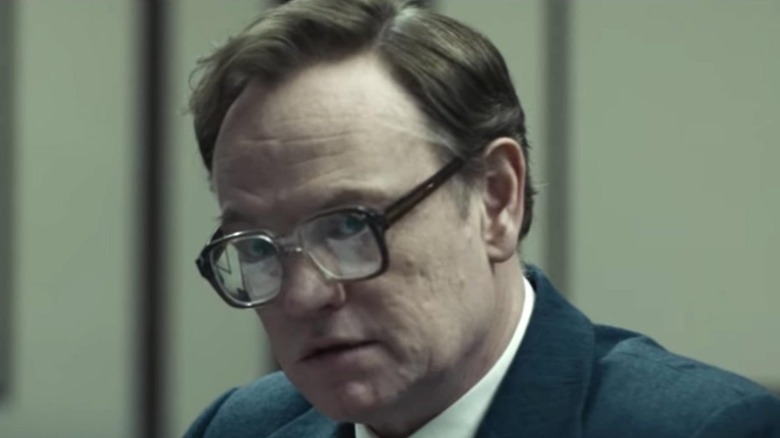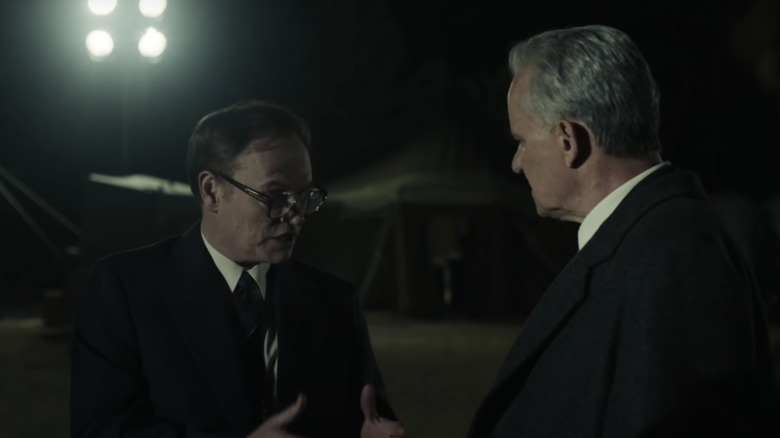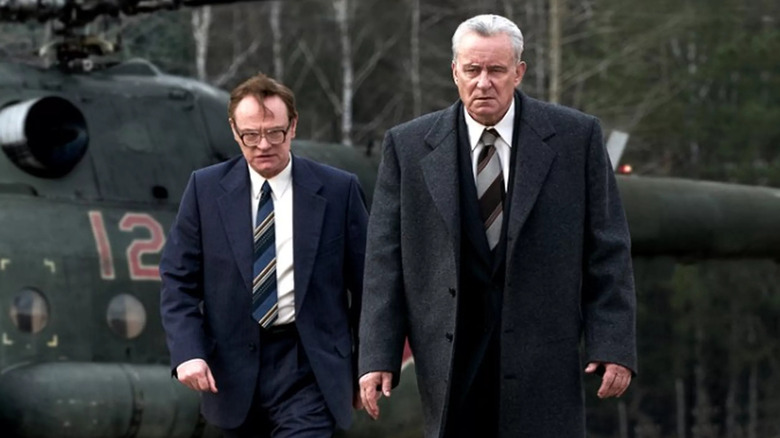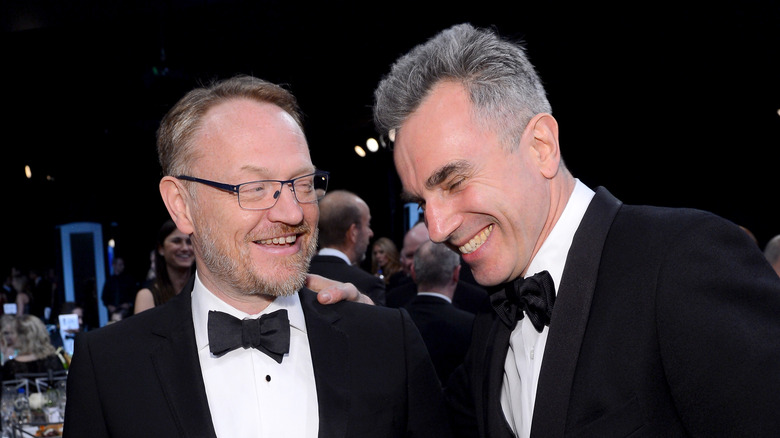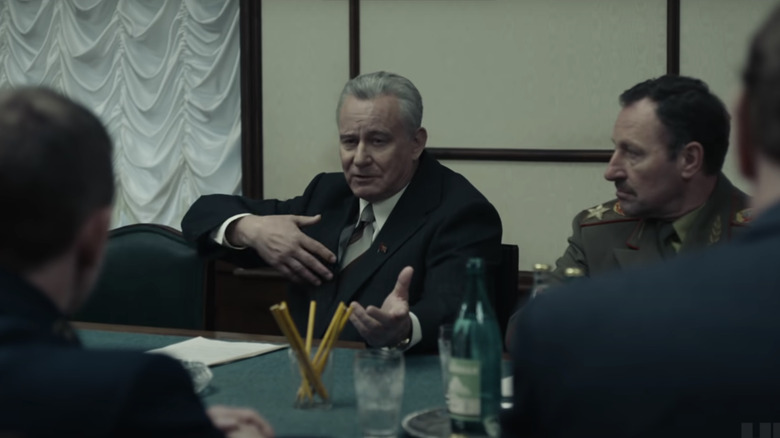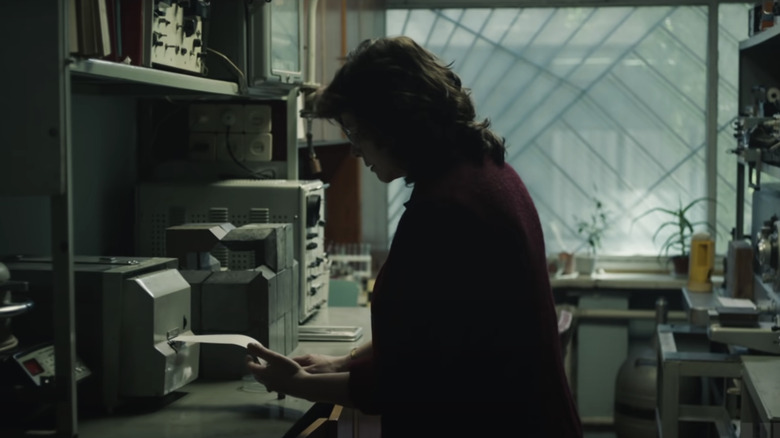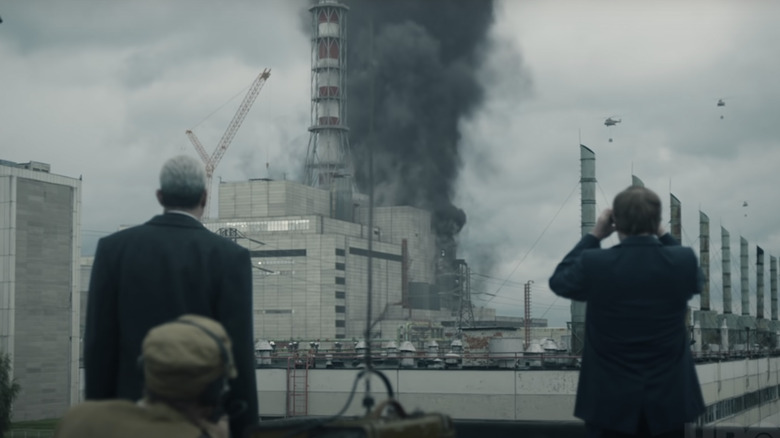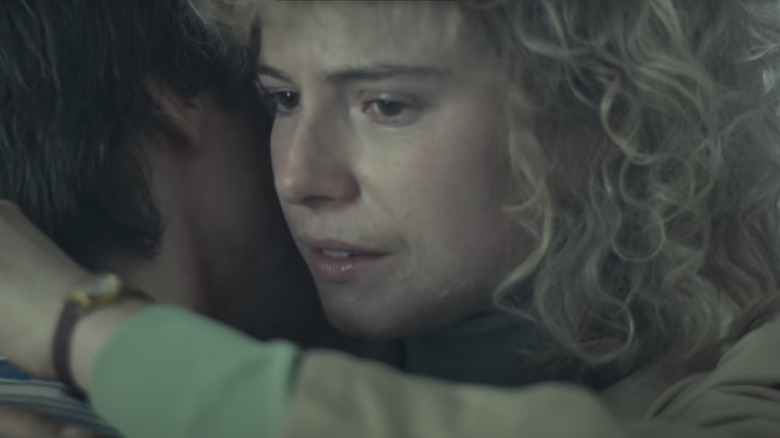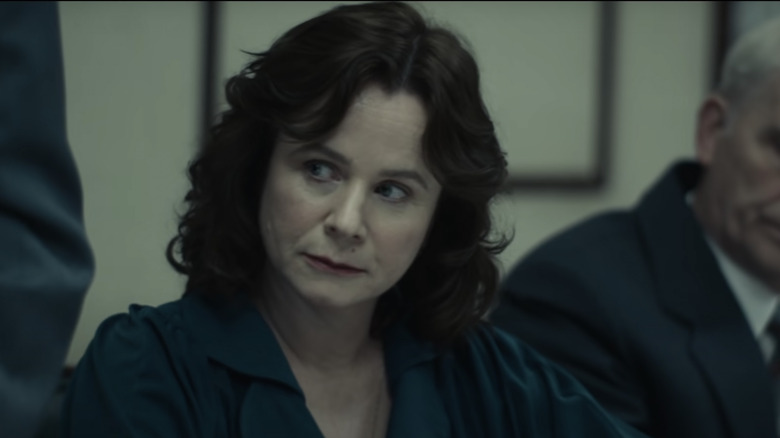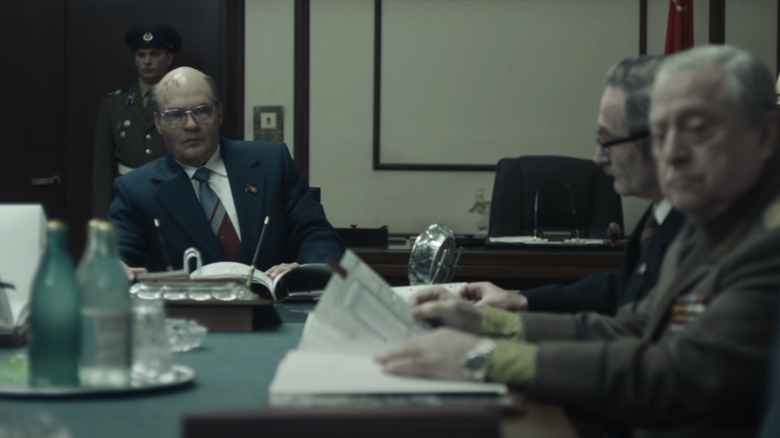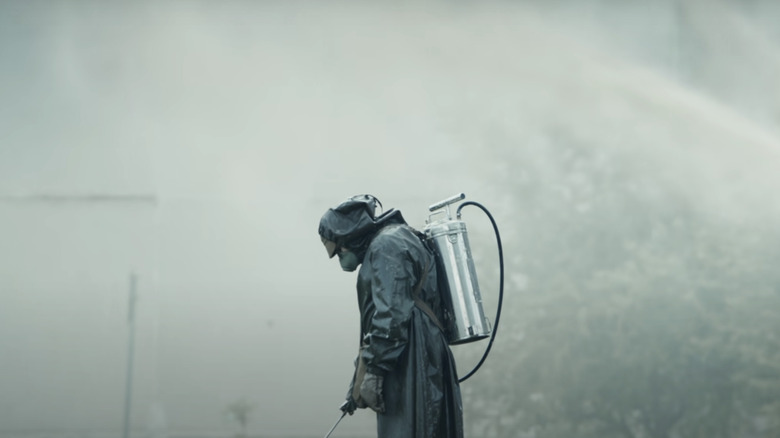The Untold Truth Of HBO's Chernobyl
HBO's "Chernobyl" miniseries was an instant phenomenon upon its release in the spring of 2019, catching audiences' and critics' attention for its realistic depiction of the horrors stemming from the Chernobyl disaster in 1986 and its poignant commentary on the catastrophic consequences of bureaucratic censorship and human arrogance. The five-episode television event presents many scientific, political, military, and civilian viewpoints on the cause, reaction, and ultimate fallout of the infamous nuclear disaster.
Created and written by Craig Mazin ("Scary Movie" and "Hangover" movies and the HBO "The Last of Us" TV series), the show stars an ensemble cast led by Jared Harris ("Mad Men," "Fringe," and "The Crown"), Stellan Skarsgård (Dr. Erik Selvig in the Marvel Cinematic Universe), and Emily Watson ("Gosford Park" and "The Theory of Everything").
The show has been lauded for its unflinchingly honest depiction of the consequences from the disaster, its relevant political commentary, nail-bitingly tension, sombre tone, and its historical and cultural accuracy — particularly from Russian audiences and critics who appreciated the show's attention to detail in its setting of the 1980s Soviet Union. It garnered several accolades across various categories for the show's writing, direction, cinematography, music and acting – including 19 Primetime Emmy nominations and 10 wins, along with numerous nominations and wins from BAFTA, Critics' Choice Television Awards, DGA, and Golden Globes.
In keeping with the show's themes of "truth" and the "cost of lies," let's avoid incurring any more debt and reveal some untold truths of HBO's widely acclaimed "Chernobyl."
The show has a companion podcast
Despite the fact that the show's producers strived for HBO's "Chernobyl" to be as historically and culturally accurate as they could possibly make it, it's very common for filmmakers and showrunners to take liberties with the truth for the sake of the narrative, and this production was no exception. To his credit, Craig Mazin, the creator and sole writer of the series, felt the need to be forthcoming about the liberties taken with the facts of the real events depicted — after all, a major theme of the show focuses on the "cost of lies."
In an effort to help bridge the gap between Hollywood and reality, Mazin created "The Chernobyl Podcast," airing concurrently with the show, where he and co-host Peter Sagal (NPR's "Wait Wait ... Don't Tell Me") discussed which elements of "Chernobyl" were based in reality and what had been changed for the storyline. Mazin is no stranger to the world of podcasts; since 2011, he's co-hosted the screenwriting series "Scriptnotes" with screenwriter John August (who penned McG's "Charlie's Angels" movies, "Charlie and the Chocolate Factory," and the live-action "Aladdin" adaptation). The "Scriptnotes" podcast is devoted to everything that would interest any screenwriter, whether they're a novice or a professional.
A month after the series finale, "The Chernobyl Podcast" produced a bonus episode with actor Jared Harris, who talked about his experience portraying Valery Legasov and the response the show received throughout the world.
The show led to a boom in Chernobyl tourism
"Chernobyl" series creator Craig Mazin visited the abandoned Chernobyl town in Pripyat as part of his research for the acclaimed miniseries. He did this to get a sense of the size of the Chernobyl nuclear power plant, which helped him understand how the workers in the control room would have responded to the explosion in reactor number 4. Mazin described his experience as "being religious" even though he "wasn't a religious man." In the month after the show premiered, tourism companies reported a 40% rise in bookings to the Chernobyl Exclusion Zone (via Reuters).
The Ukrainian Government, led by President Volodymyr Zelensky, subsequently announced that Chernobyl would become an official tourist site. After a visit to the exclusion zone, Zelensky said, "We must give this territory of Ukraine a new life ... until now, Chernobyl was a negative part of Ukraine's brand. It's time to change it."
Even though the government's tourism campaign may have helped Ukraine's economy, officials and scientific experts have expressed their doubts about the growing number of visitors pouring into the abandoned city, which is still among the most radiologically contaminated locations on Earth more than three decades after the accident. To fuel the skepticism, there have been reports of bad behavior on part of the tourists, who would ignore health and safety protocols by entering dangerous spots to take selfies, rummaging through abandoned buildings, and stealing objects left behind as souvenirs (via The Washington Post).
Daniel Day-Lewis was the first choice for Legasov
Jared Harris has repeatedly admitted that three-time Academy Award winner Daniel Day-Lewis was apparently the first choice to portray Soviet nuclear scientist Valery Legasov in HBO's "Chernobyl." Harris told The Guardian, "He was supposed to do the part in Chernobyl. Thank God he retired!," referring to Day-Lewis' announcement that he was retiring from acting in 2017 after finishing production on Paul Thomas Anderson's movie "Phantom Thread."
It wouldn't be the first time that Day-Lewis was the first choice for a role that eventually went to Harris. Harris revealed that Day-Lewis was also initially offered the role of arch-nemesis Professor Moriarty in Guy Ritchie's "Sherlock Holmes: A Game of Shadows," which was rumored to be circling around Sean Penn and Brad Pitt before Harris was hired a week before the film started shooting. Harris has quipped about this often, saying, "Everything gets offered to him first. Everything!" (via Extra.ie)
Day-Lewis and Harris previously collaborated on Steven Spielberg's acclaimed 2012 biographical drama "Lincoln," in which Day-Lewis portrayed the titular historical United States president and Harris portrayed Lieutenant General Ulysses S. Grant. Day-Lewis even made it into Harris' acceptance speech for his BAFTA win as Best Leading Actor for "Chernobyl": "Don't stay away too long, you know, I miss seeing you up there."
Why the change in accents?
Viewers of "Chernobyl" will notice that even though the show takes place in Soviet Ukraine, none of the characters speak Ukrainian or Russian — or even English with a Russian accent, as they would in most English-language movies and TV shows set in a non-English speaking region. While it may seem like an oversight, the dialects and accents of the show's characters were a conscious decision for the producers.
The director of "Chernobyl," Johan Renck, revealed in BAFTA's "The Making of Chernobyl" that there were discussions about producing the show in Russian and Ukrainian, but that idea was ruled out for the global production. Series creator Craig Mazin explained on the show's companion podcast that Russian accents in English media tended to appear "comical," which would obviously impair the serious tone of the disaster-tragedy show.
The producers considered having actors do vague Eastern European accents that weren't as strong as full-blown Russian accents but would be noticeable; however, they found that actors would "act accents" rather than being true to the emotions of their characters, after which the producers decided to scrap the idea completely. They decided to keep the show's casting within the confines of Europe by avoiding casting American actors, as they realized that — much like the Russian accents — American actors would be too distracting for the viewers to focus on the drama of the show (via Cosmopolitan).
The scripts for each episode are officially available to read
Given that film studios and television networks often go out of their way to prevent the screenplays for their movies and TV shows from leaking online, it's commendable that HBO allowed series creator and writer Craig Mazin to release his scripts for all five episodes of "Chernobyl."
While the show is engaging as it is, its brutally honest depiction of the disaster and its tragic outcome can be difficult to watch for some audiences. This includes the storyline where Pavel (played by Barry Keoghan) is forced to kill the radioactive canines and felines in the Exclusion Zone, or when the Chernobyl workers and first responders are shown gruesomely succumbing to radiation exposure. Or even eerie and terrifying sequences, such as when the three "divers" must make their way through the water-filled reactor with no light in order to drain the water and prevent another catastrophe. Instead of rewatching those scenes, it could be easier for such viewers to read the screenplays — unsurprisingly, Mazin does a fantastic job of putting those horrors into words.
Will there be a Season 2?
When a TV show is as popular in its first season as "Chernobyl" was, network executives often find it tempting to fast-track the release of a second season and plan a full franchise. HBO's "Chernobyl," however, was always planned to be a limited series and a one-time television event, and the story was written to conclude in five episodes, as series creator Craig Mazin made clear in interviews promoting the show and on the show's official podcast.
However, when asked by Decider about the scope for a second season, Mazin pointed out the possibility of focusing on another crisis similar to Chernobyl, such as the Bhopal gas disaster or the Fukushima nuclear disaster. These stories, which share a common theme of fatal, tragic incidents caused and covered up as a result of human ignorance and arrogance, would undoubtedly be formidable successors to the story of Chernobyl and make for an intriguing anthology series.
For those who are curious, the Bhopal gas disaster was an industrial accident that occurred in 1984 when a highly deadly gas (methyl isocyanate) spilled from a pesticide facility in Bhopal, India, and spread to nearby towns. Over 500,000 people were exposed to the gas, making this chemical disaster one of the worst in world history (per The Atlantic). The 2011 Fukushima nuclear disaster was the result of a nuclear accident at a power station in Okuma, Japan, which was brought on by the worst earthquake ever registered in that country. The disaster was given a level seven classification on the International Nuclear Event Scale (INES), making it the only other event to get such a designation other than Chernobyl (per International Business Times).
The real-life Lyudmila's response to the show
Amidst the political and bureaucratic drama taking place throughout the show, Lyudmila Ignatenko's storyline in "Chernobyl" provides a civilian perspective on the disaster and its consequences on innocent Soviet citizens who are unaware of the true dangers of the radiation stemming from the explosion. Much like most of the show's characters, Lyudmila and her husband Vasily Ignatenko were real people; as series creator Craig Mazin revealed on the show's companion podcast, Lyudmila's story was one among many of the civilian accounts and testimonies of the disaster featured in the book "Voices From Chernobyl."
In an interview with BBC Russia following the success of the show, the real-life Lyudmila broke her silence and claimed that she was never approached for permission by the show's producers to use her name or her story. She revealed that the release of HBO's "Chernobyl" resulted in journalists invading her privacy to get an interview with her. She also faced accusations from several people saying that she "killed her baby," referring to the scenes in the show when the pregnant Lyudmila had close contact with her radioactively infected husband despite warnings from doctors.
HBO/Sky refuted her allegations, saying that Ignatenko and the production crew had multiple discussions and that she had been given the opportunity to offer feedback during the writing process. They added that Lyudmila never indicated during the process that she did not want her and her husband's story to be featured on the show (via BBC).
Ulana Khomyuk isn't a real person
In the show, Ulana Khomyuk (portrayed by Emily Watson) is a nuclear physicist who joins Valery Legasov and Boris Shcherbina in their investigation into the Chernobyl disaster after detecting the radiation in Belarus (then Byelorussia), nearly 250 miles from the site of the nuclear disaster. In the show's penultimate episode, Ulana steps in as the voice of reason and accountability when Legasov must decide between disclosing the truth about the Soviet Union's neglect with the RBMK reactors that caused the Chernobyl accident and playing it safe and remaining on good terms with the Union (a suggestion made by the pragmatic Shcherbina).
Unlike Legasov and Shcherbina, who played a significant role in mitigating the disaster in real life, the character of Ulana Khomyuk isn't based on any specific real-life figure; she's a composite character made to mirror the real-world women who were a vital part of the medical and scientific scene in the Soviet Union. Series creator Craig Mazin noted in "The Chernobyl Podcast" that although the Soviet Union had few women in political and governmental roles, in the fields of science and medicine, "the Soviets were actually more progressive than [Americans]." (via Bustle)
Russian TV made its own Chernobyl retelling with CIA as villains
HBO's "Chernobyl" received positive reviews from Russian audiences and critics, who cited that the show did a better job of portraying the Chernobyl disaster and its Soviet setting than any Russian film or television program. However, the praise didn't prevent accusations from state-run television and Russian tabloids, who claimed that the show had distorted the truth by portraying Soviet-era leaders in a negative light, even going so far as to label the series "propaganda" (via Hindustan Times).
It was reported that, as a response to the HBO show, Russian NTV — known to be pro-Kremlin — was set to air its own "patriotic" retelling of the Chernobyl disaster, including a plot about alleged CIA involvement. According to the description of the show, the plot centers on a Russian counterintelligence agent assigned to track a CIA operative who's been dispatched to Pripyat to gather intelligence on the Chernobyl power plant (via The Guardian).
In an interview with the Russian tabloid Komsomolskaya Pravda, the director of NTV's "Chernobyl," Alexey Muradov, cited the theory that Americans had infiltrated the Chernobyl nuclear power plant — asserting that "historians did not deny" that an agent of the "enemy's intelligence services" was present. As per Muradov, the show "will tell viewers about what really happened back then" and "proposes an alternative view on the tragedy in Pripyat." An apparent trailer for the NTV show was uploaded to YouTube, but was later removed after backlash (via BBC).
The show's relevance during the pandemic
At the onset of the COVID-19 pandemic, Chinese citizens noticed the similarities between the Soviet response to the Chernobyl disaster and the Chinese government's initial handling of the coronavirus outbreak (per The New York Times). In particular, they noted the communist governments' incompetence when handling the crises, and the suppression of information surrounding them.
In both cases, the dangers were seemingly invisible — radioactive contamination and an airborne respiratory virus. In the case of Chernobyl, it was only after countries neighboring the Soviet Union, such as Sweden and Germany, reported on radiation flying over from the Chernobyl power plant that Soviet leadership admitted there was a problem. Similarly, Chinese authorities only reported the first cases of the coronavirus and its spread outside of Wuhan days after Thailand and Japan reported cases of the infection. The Chinese government issued warnings against spreading what they called "rumors," articles and comments about the virus were deleted, and people were detained for "spreading rumors" after posting about the virus on social media (via Quartz).
As a result, netizens took to the "Chernobyl" page on Chinese film review website Douban to channel their frustrations over their government's handling of the virus, quoting the show ("Every lie we tell incurs a debt to the truth. Sooner or later that debt gets paid") and pointing out the parallels between the show's story and current events. The "Chernobyl" page on Douban eventually amassed over 200,000 ratings.
